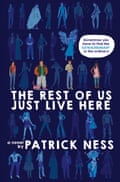Do you know what’s great about books? For me, it’s not just the story, the tale that has been crafted from scratch by an author who thought, “You know what, it might be a good idea to put that on paper, or at least a computer document.” I think that every time you walk into Waterstone’s, or Foyles, or Hatchards or any other bookshop, you spare a thought for the cover. And you acknowledge the beauty of that cover. Because that cover had to be crafted just like the book itself. The front cover and the blurb are incredibly important.
If you take a ride into the land of deep thinking, you’ll realise that the cover is a mark of honesty, or at least it once was; with ghostwriting no one can really tell anymore, can they? The cover, despite the saying “don’t judge a book by its cover”, is probably exactly what you do judge the book by. The irony of it, right?
So could you imagine reading a book without seeing the cover? Without knowing who wrote it? If all books just came in brown paper wrapping and no clue as to who the author is? Every book would look the same. And bookshops would look pretty bland too as well. But most importantly, you would never know whether the book you’re reading is that James Dashner novel you’ve been meaning to buy or whether it’s a book on the migration of birds from north to south habitats written by a university lecturer.
Let’s face it: covers of books are pretty important.
So what if you were sent a book one day and the book met the above criteria? No cover, no blurb, no copyright notices, not even an acknowledgements page?! And because there isn’t a Shazam for books, you really are in the dark. For some reason, Guardian Children’s Books seemed to think it was a good idea to do exactly that.
During the Easter holidays, a package arrives at my door. It’s the day before I’m due to go on holiday, so it looked pretty weird having this sit in the middle of a hotel room:
Thank you @EmilyDrabs for this! I'm desperate to know what it is! pic.twitter.com/08oFbjxdVK
— Joshua A.P (@thurrockjosh) April 9, 2015
And the result? It’s actually pretty mortifying reading the book without knowing the author or seeing the cover! Let me tell you all about it.
I’m the type of reader that spends weeks reading about the book before going out to buy it, certain I know more about the characters and storyline than I would know if I read the book itself. To not know the author of the book means that I don’t get that right. I don’t get the chance to do some research on the book. And I hated this.
Not only that though, but I couldn’t discuss this book with anyone, or track it on Goodreads. I tend to add books that I’m reading to Goodreads so I can track the reading and complete the reading challenges. It’s a stupid incentive to keep reading I suppose, but it works. Not only that, but I have a small network of people I can discuss the book with.
But I couldn’t do either. I couldn’t ask people stuff about it, discuss it, fangirl over it, none of that was possible. And I couldn’t go onto websites or blogs to find out about the reviews and thoughts that other people had been giving it, because it all came down to the fact that I really didn’t know what it was called!

When it did come round to the time where I was told the book was actually The Rest Of Us Just Live Here by Patrick Ness, I was shocked; excited, but also a bit sad as well.
When I didn’t know the title of the book, and I didn’t know who wrote it, I was able to make a pure judgement on it. I wasn’t clouded by the fact that More Than This is still one of my favourite books. I could judge the book without being blinded by adoration for the author. Instantly after writing my initial review of it for the site, I opened the book and was a bit sad that I gave the book the thoughts I gave it. It turns out that I actually really disliked this book, and were it that I was able to know the author and title beforehand, I have reasons to believe that my thoughts on it would have been slightly less honest.
So believe me when I say: reading a book blind may be slightly beneficial.
It then leads me to question whether I was actually a bit scared of reading this book blind. Whether I was literally scared of the unknown. Reading a book blind is a completely bizarre experience, and I won’t list all the reasons again, but I much prefer to read a book where I know who’s written it.
That said, I definitely recommend reading a book blind to anyone who hasn’t tried it. Have someone buy a book for you then have them conceal all important information. Read the book, then tell the world what you thought! Open it up and have all questions answered. Simple! Kind of.
Now would be a good time to explain something as well.
There’s a psychological effect called transference. In a nutshell, it basically states that if something is similar to something you’ve experienced in the past, then you’re likely to transfer those feelings towards that old thing towards the new one as well. For example, if an old teacher you had was short and had grey hair, and you get a new teacher with grey hair who’s also short, it’s likely that you will think the same of them as you did of the old teacher, regardless of what the feelings actually were.
This experiment was not pleasant to do, and I personally hated it. The sad thing is that it made me hate Patrick’s book as well, when in all honesty I don’t think that was right and I don’t think those feelings were genuine either. Because I hated the experiment, I think I experienced something similar to transference in this experiment towards Patrick’s book as well. The moral of the story is you’re entitled to hate a book, but it might be worth giving it a second chance before making a judgement on it, especially after doing a blind reading.
Sure: reading the book blind is brutal. It’s not pleasant, and I felt as though you couldn’t connect with the book as much after reading it blind, but I’d urge as many of you as possible to go try it, and maybe surprise yourself in the process too.
Is there a books topic that you’re just burning to write about? Join the Children’s Books site and you could do just that!
